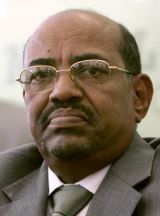Sudan’s Bashir increasingly isolated over Darfur
Sept 17, 2006 (KHARTOUM) — Sudanese President Omar al-Bashir finds himself increasingly isolated as his peace partners rally the growing consensus in favour of a UN peacekeeping force for Darfur, analysts said Sunday.
 The Sudan People’s Liberation Movement, which formed a national unity government with Beshir’s long-ruling National Congress after signing a landmark peace deal last year, confirmed its acceptance of UN troops in Darfur.
The Sudan People’s Liberation Movement, which formed a national unity government with Beshir’s long-ruling National Congress after signing a landmark peace deal last year, confirmed its acceptance of UN troops in Darfur.
After a three-day meeting in the southern capital of Juba, the former rebel movement’s leadership justified its position by saying Sudan needed to “avert confrontation with the international community.”
SPLM leader Salva Kiir, also Sudan’s first vice president, was quoted in a Sudanese paper Saturday as saying a UN deployment was needed to “protect civilians from the atrocities” of the pro-government Janjaweed militia.
“The government of Khartoum will face an internal crisis in the coming phase as a result of disagreements with the SPLM over the deployment of international troops in Darfur,” independent Sudanese analyst Mohamed Abu Sid said.
The SPLM’s split from Bashir on the issue of peacekeepers is one of the most serious cracks in the unity government since its inception last year.
The cabinet formed by the former foes is the centrepiece of the January 2005 peace agreement that ended more than two decades of north-south civil war.
Beshir “is definitely isolating himself,” said Monika Thakur, an Africa expert at the American University in Cairo.
“But Sudan has always pursued its own agenda,” she said. “In terms of regime survival it makes sense,” Thakur added.
Another of the veteran leader’s peace partners broke ranks recently over the issue of a UN deployment when Darfur rebel leader Minni Minnawi also said African troops in the troubled western region needed to be replaced.
Minawi had signed a peace deal with Khartoum in May, creating a schism among the rebel movements which have fought the central government and its allied militias since early 2003.
Brian Thomson, of the London-based research centre Chatham House, argued that the SPLM’s call on Beshir to accept the UN’s plans may do little to inflect the Sudanese strongman’s position.
“The Bashir government is used to being isolated,” he said.
“In terms of the government’s policy in Darfur, the track record is that it only acts when there is serious pressure,” said Thomson. “But right now, (Bashir) may have made the calculation that the United States is busy with other things.”
Bashir has consistently rejected international calls for a UN deployment in Darfur, where three and half years of war and famine have left up to 300,000 people dead and some 2.5 million displaced.
Next week, US President George W. Bush heads to the United Nations to seek new action to quell the violence in Darfur. The UN Security Council adopted a resolution late last month calling for a UN deployment.
On Sunday, British Prime Minister Tony Blair appealed to the European Union to apply heavy pressure on the Sudanese government and rebels to stop the civil war in Darfur.
And on Friday, European Union ministers, meeting in Brussels, urged Sudan to allow UN troops to replace the cash-strapped AU mission whose mandate expires at the end of the month.
World diplomats have found the support of an array of celebrities in their efforts to restore peace in Darfur.
Hollywood star George Clooney and Nobel Peace Prize laureate Elie Wiesel pleaded with the Security Council last week, while the latest initiative came from a group of British pop stars including Elton John and Annie Lennox.
The singers signed an open letter calling on the British government to “move Darfur to the top of its priority list until a UN force is deployed and the people of Darfur are protected.”
Bashir remained defiant however, reiterating his allegations that the UN’s deployment plans are a US-engineered ploy to invade his country and plunder its resources.
“Sudan is (one of) the first African countries in Africa south of the Sahara to get independence, (and) we are not ready to be the first to be re-colonised,” he said last week.
Sunday, which was declared the “Global Day for Darfur” by some 30 international human rights organisations, was welcomed in Khartoum by a demonstration denouncing a “Jewish conspiracy” engineered in Washington.
(AFP/ST)
